CLICK ME
Menu
If I Was Tired, I just Had a Cup of Coffee Instead of Taking a Break
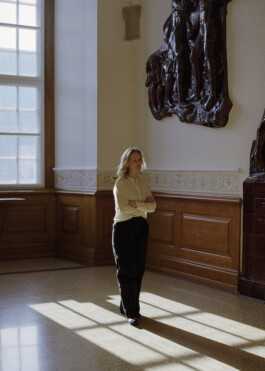
2019 was the year of climate. It was at the top of the agenda worldwide, just as it was for former Minister for the Environment and climate advocate Ida Auken. But for the Danish politician, 2019 was also the year when a busy working life became an impossible working life, and in 2020 her body said stop. The realization that enough suddenly was more than enough was not easy to accept, and for Ida, it was essential to learn to take care of herself and take her bodily symptoms seriously – symptoms that had been present for a long time.
We meet Ida Auken by the entrance to Christiansborg Castle, the house of the Danish parliament. After going through the mandatory security check that we know so well from airports, we walk upstairs to Ida’s office. The topic of our conversation is her encounter with stress – about her realization and acceptance of the fact that sick leave was needed, about getting better, and what her work life looks like now, on the other side.
As a member of the Danish parliament for almost 15 years, being busy is not something new to Ida Auken. Doing things at a pace that could easily be confused with an episode of the Danish TV series Borgen is everyday to Ida. Or was. In some periods, everything was done on a tight schedule, and afterward, she would ask herself: “How did I do this - with four shopping bags and my kids’ backpacks on my bike?” Up until then, things usually resolved themselves, but by the beginning of March 2020, ordinary daily tasks seemed chaotic all of a sudden. Even biking home from work with groceries. Suddenly, Ida found herself unable to do her work and manage things at a pace she was used to - at work and in her private life.
As a politician, you are used to the fact that the agenda can change from one moment to the next; it all depends on pressing matters and what happens out in the world. But for Ida, she remembers one specific episode where her body acted in total discomfort, a result of being out of contact with her mind and body for a long period of time. She thought she would take part in a panel debate which turned out to be a 15-minute presentation by her. She was struck by a discomfort that did not leave her body afterward. That day was the turning point for her.
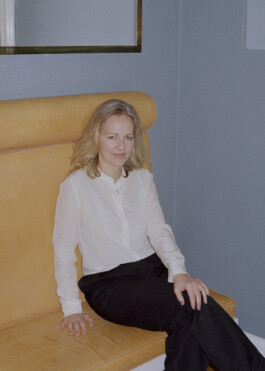
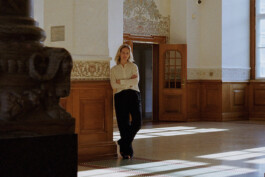
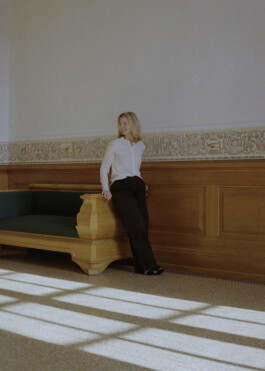

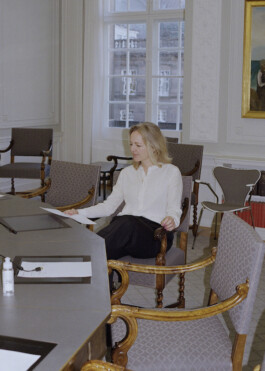
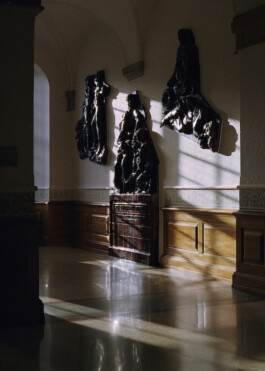
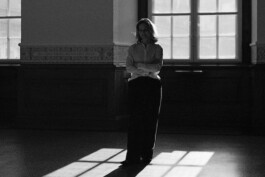
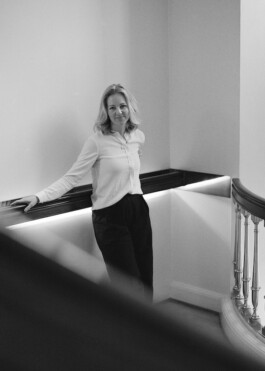
“Getting sick with stress taught me a lot. I got to know myself better than I did before, and it has made me even stronger than before.”

The notification of illness
From that day Ida’s life turned upside-down. It was a clear call from her body. Ida’s husband asked her to make an appointment with her doctor the following day. Almost too quickly, Ida replied: “No, I don’t have time tomorrow.” Like other days, Ida’s calendar was packed with meetings. At 7:30 AM, she had a meeting with the Minister of Climate, at 8:15 AM a presentation for an advertising bureau, at 9 AM a meeting with the Climate Committee, and at 12 PM a meeting at the Confederation of Danish Industry. And that was not the end of the day. Ida did not even have five minutes to call her doctor. Ida’s husband just responded: “Do you hear yourself?” The question was an eye-opener, and she realized she needed to take prolonged sick leave.
The acceptance of being sick is not easy. Unfortunately, many people don’t react until their body says stop – when it is no longer a choice but a forced move when the body can’t take anymore. Some people experience getting up in the morning and suddenly cannot put on their clothes, while others may be affected by blood clots, palpitations, or memory loss. Our bodily symptoms differ between every individual, but common to us all is that it is crucial to notice them, stop and think about why we feel what we do and how to change it. “What happens is that from a high level of activity we go from experiencing stress symptoms to what is called burnout - or fatigue syndrome. The symptoms have kept you on a steady high level of energy as if there was a lion chasing you, but suddenly you cannot run anymore, and your body almost goes into hibernation to survive. I simply collapsed - my body and my mind,” Ida explains.
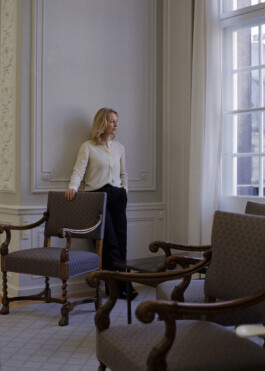

No echo in eternity
Today, Ida is well and back at work, but on days when she feels the pressure, she returns to a quote by the Danish philosopher Kierkegaard: “Something can be noisy in the present, but it does not have the slightest echo in eternity.” This helps her put a perspective on a full inbox, that even if she doesn’t manage to reply to everyone that day - or even week - it doesn’t have any impact in the long run. Maybe there are a few of us who could benefit from that saying.
“Getting sick with stress taught me a lot. I got to know myself better than I did before, and it has made me even stronger than before. I will never ignore the slightest symptoms my body tries to tell me. In the past, I misinterpreted every symptom of my body - restlessness, palpitations, tiredness, and shaking hands. If I was tired, I just had a cup of coffee instead of taking a break. Getting to know myself makes me stronger, and now I know what to do when the symptoms revisit my body. The symptoms are warnings from our bodies - it gives you a chance to take a break before your body says stop.”
All of us can be affected by stress. Especially if we do not listen to our body and learn how to say ‘no’. Different people’s stress threshold is different, and we have different levels of bodily energy, but none of us are superhumans. “If you think you are in a different category than others, having more energy and mental surplus to help everyone else, coming in contact with symptoms of stress makes you aware that you are just a human being like everyone else. I think we should be thankful when our bodies say stop because we have exceeded our personal limits. It will make us aware of what our limits are.” Although when Ida tells the story, it sounds like something we all could learn from, don’t be fooled; it’s not a fairytale. It has been instructive, but it is definitely not a time she wants to go through once more. “Some days, I was sure I would not get back to being myself. I didn’t think I would ever get strong again, be happy again, or be social again. But my family helped me to look on the bright side. I followed the light, and I was in the process of getting back to being myself. For me, getting sick with stress has given me a lot. I have learned to notice that even in dark times, there is joy.” Just like Leonard Cohen so famously said: “There’s a crack in everything, that’s how the light gets in”. With that experience in mind, she started to get better, day by day.
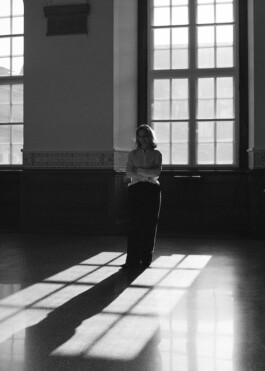
“The perfect working life is to find the work that makes you happy and joyful and that you think is meaningful. There is no template for a meaningful working life; it can be many things - but most importantly, we must be able to see the meaning of what we do.”

Only you can make it perfect
Self-care, garden therapy, and books with advice about being your own best friend resonate in the corners. But, if we fill our lives with work and a full calendar, when will we find the time to get in contact with ourselves and be our own best friends? Work takes up much time for us modern individuals - of course, for some more than for others. Our priorities are different, but for all of us, it is about finding inner peace and joy and balancing the flow of our work life and private lives. “The perfect working life is to find the work that makes you happy and joyful and what you think is meaningful. There is no template for a meaningful working life; it can be many things - but most importantly, we must be able to see the meaning of what we do.”
The perfect working life cannot be put into a formula; what may seem perfect to you is not necessarily the same for your neighbor. What is crucial is that we learn to connect with our mind and body, look into ourselves, our feelings, and thoughts about what we do and what we want from our lives. Only you yourself know what it takes for you to live exactly the life you find perfect.
If you're looking to enhance your own leadership skills or unlock hidden potentials, bounce over to weareheadlight.com and see what we can accomplish together.
If I Was Tired, I just Had a Cup of Coffee Instead of Taking a Break

2019 was the year of climate. It was at the top of the agenda worldwide, just as it was for former Minister for the Environment and climate advocate Ida Auken. But for the Danish politician, 2019 was also the year when a busy working life became an impossible working life, and in 2020 her body said stop. The realization that enough suddenly was more than enough was not easy to accept, and for Ida, it was essential to learn to take care of herself and take her bodily symptoms seriously – symptoms that had been present for a long time.
We meet Ida Auken by the entrance to Christiansborg Castle, the house of the Danish parliament. After going through the mandatory security check that we know so well from airports, we walk upstairs to Ida’s office. The topic of our conversation is her encounter with stress – about her realization and acceptance of the fact that sick leave was needed, about getting better, and what her work life looks like now, on the other side.
As a member of the Danish parliament for almost 15 years, being busy is not something new to Ida Auken. Doing things at a pace that could easily be confused with an episode of the Danish TV series Borgen is everyday to Ida. Or was. In some periods, everything was done on a tight schedule, and afterward, she would ask herself: “How did I do this - with four shopping bags and my kids’ backpacks on my bike?” Up until then, things usually resolved themselves, but by the beginning of March 2020, ordinary daily tasks seemed chaotic all of a sudden. Even biking home from work with groceries. Suddenly, Ida found herself unable to do her work and manage things at a pace she was used to - at work and in her private life.
As a politician, you are used to the fact that the agenda can change from one moment to the next; it all depends on pressing matters and what happens out in the world. But for Ida, she remembers one specific episode where her body acted in total discomfort, a result of being out of contact with her mind and body for a long period of time. She thought she would take part in a panel debate which turned out to be a 15-minute presentation by her. She was struck by a discomfort that did not leave her body afterward. That day was the turning point for her.








“Getting sick with stress taught me a lot. I got to know myself better than I did before, and it has made me even stronger than before.”

The notification of illness
From that day Ida’s life turned upside-down. It was a clear call from her body. Ida’s husband asked her to make an appointment with her doctor the following day. Almost too quickly, Ida replied: “No, I don’t have time tomorrow.” Like other days, Ida’s calendar was packed with meetings. At 7:30 AM, she had a meeting with the Minister of Climate, at 8:15 AM a presentation for an advertising bureau, at 9 AM a meeting with the Climate Committee, and at 12 PM a meeting at the Confederation of Danish Industry. And that was not the end of the day. Ida did not even have five minutes to call her doctor. Ida’s husband just responded: “Do you hear yourself?” The question was an eye-opener, and she realized she needed to take prolonged sick leave.
The acceptance of being sick is not easy. Unfortunately, many people don’t react until their body says stop – when it is no longer a choice but a forced move when the body can’t take anymore. Some people experience getting up in the morning and suddenly cannot put on their clothes, while others may be affected by blood clots, palpitations, or memory loss. Our bodily symptoms differ between every individual, but common to us all is that it is crucial to notice them, stop and think about why we feel what we do and how to change it. “What happens is that from a high level of activity we go from experiencing stress symptoms to what is called burnout - or fatigue syndrome. The symptoms have kept you on a steady high level of energy as if there was a lion chasing you, but suddenly you cannot run anymore, and your body almost goes into hibernation to survive. I simply collapsed - my body and my mind,” Ida explains.


No echo in eternity
Today, Ida is well and back at work, but on days when she feels the pressure, she returns to a quote by the Danish philosopher Kierkegaard: “Something can be noisy in the present, but it does not have the slightest echo in eternity.” This helps her put a perspective on a full inbox, that even if she doesn’t manage to reply to everyone that day - or even week - it doesn’t have any impact in the long run. Maybe there are a few of us who could benefit from that saying.
“Getting sick with stress taught me a lot. I got to know myself better than I did before, and it has made me even stronger than before. I will never ignore the slightest symptoms my body tries to tell me. In the past, I misinterpreted every symptom of my body - restlessness, palpitations, tiredness, and shaking hands. If I was tired, I just had a cup of coffee instead of taking a break. Getting to know myself makes me stronger, and now I know what to do when the symptoms revisit my body. The symptoms are warnings from our bodies - it gives you a chance to take a break before your body says stop.”
All of us can be affected by stress. Especially if we do not listen to our body and learn how to say ‘no’. Different people’s stress threshold is different, and we have different levels of bodily energy, but none of us are superhumans. “If you think you are in a different category than others, having more energy and mental surplus to help everyone else, coming in contact with symptoms of stress makes you aware that you are just a human being like everyone else. I think we should be thankful when our bodies say stop because we have exceeded our personal limits. It will make us aware of what our limits are.” Although when Ida tells the story, it sounds like something we all could learn from, don’t be fooled; it’s not a fairytale. It has been instructive, but it is definitely not a time she wants to go through once more. “Some days, I was sure I would not get back to being myself. I didn’t think I would ever get strong again, be happy again, or be social again. But my family helped me to look on the bright side. I followed the light, and I was in the process of getting back to being myself. For me, getting sick with stress has given me a lot. I have learned to notice that even in dark times, there is joy.” Just like Leonard Cohen so famously said: “There’s a crack in everything, that’s how the light gets in”. With that experience in mind, she started to get better, day by day.

“The perfect working life is to find the work that makes you happy and joyful and that you think is meaningful. There is no template for a meaningful working life; it can be many things - but most importantly, we must be able to see the meaning of what we do.”

Only you can make it perfect
Self-care, garden therapy, and books with advice about being your own best friend resonate in the corners. But, if we fill our lives with work and a full calendar, when will we find the time to get in contact with ourselves and be our own best friends? Work takes up much time for us modern individuals - of course, for some more than for others. Our priorities are different, but for all of us, it is about finding inner peace and joy and balancing the flow of our work life and private lives. “The perfect working life is to find the work that makes you happy and joyful and what you think is meaningful. There is no template for a meaningful working life; it can be many things - but most importantly, we must be able to see the meaning of what we do.”
The perfect working life cannot be put into a formula; what may seem perfect to you is not necessarily the same for your neighbor. What is crucial is that we learn to connect with our mind and body, look into ourselves, our feelings, and thoughts about what we do and what we want from our lives. Only you yourself know what it takes for you to live exactly the life you find perfect.
Blegdamsvej 6, 1st floor
Copenhagen, Denmark
Telephone +45 3232 3232
journal@weareheadlight.com
© 2020 Headlight Journal. All rights reserved.
Blegdamsvej 6, 1st floor
Copenhagen, Denmark
Telephone +45 3232 3232
journal@weareheadlight.com
© 2020 Headlight Journal. All rights reserved.